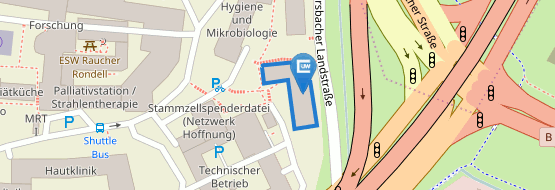AG Berberich-Siebelt
AG Berberich-Siebelt: Molekulare und zelluläre Immunität
Leitung
apl. Prof. Dr. F. Berberich-Siebelt, Büro Raum 125a, email: friederike.siebelt(at)uni-wuerzburg.de; tel 0931 / 31-81208, Curriculum vitae
Mitarbeiter
- Benjamin Lunz, M.sc., technischer Angestellter
- Dr. Yin Xiao, Postdoc
- Boutaina El kenz, Postdoc
- Christina Chiarolla, Doktorandin
- Nadine Hundhausen, Doktorandin
- Xiaoli Lou, Doktorandin
- Gauray Jethva, Masterand
Telefonnummern
- AG Büro: 0931 / 31 - 81232
- AG Labor 1: 0931 / 31 - 81233
Die Forschungsgruppe "Molekulare und zelluläre Immunologie" unter der Leitung von Prof. Friederike Berberich-Siebelt interessiert sich besonders für CD4-positive T-Helferzellen und regulatorische T-Zellen. Dabei stehen Expressionsmuster und Aktivierung sowie Signaltransduktionsgebung der Transkriptionsfaktorenfamilie NFAT im Vordergrund. Untersucht werden die Rolle einzelner Familienmitglieder, derer Isoformen und die Aktivitätsbeeinflussung durch Modifikationen, insbesondere der Sumoylierung, sowie das Zusammenspiel mit anderen Transkriptions-(ko)-faktoren. Neben der molekularen Analyse werden diese Fragen mit Hilfe von transgenen Mausstämmen und diverser Krankheitsmodelle für Autoimmunerkrankungen adressiert.
The research group „molecular and cellular immunology“ led by Prof. Friederike Berberich-Siebelt has a special interest in CD4-positive T-helper cells and regulatory T cells. Here, focus lies on the expression pattern and activation as well as signal transduction of the transcription factor family ‘NFAT’. Research deals with the role of individual family members, their isoforms, and the influence of modifications, especially by sumoylation, as well as the interplay with other transcription (co-) factors. Besides the molecular analyses, these questions are addressed with the help of transgenic mice and several preclinical mouse models for autoimmune diseases.
Drittmittel / Funding:
- DFG TRR221 https://www.gvhgvl.de/
- DFG FOR2830
- Deutsche Krebshilfe Einzelförderung

